My escape from Tegucigalpa did not come quickly. I had hoped to catch
a bus to some nice, small village on the outskirts of town, and start
biking in the morning. I rushed across town to catch the 7 pm bus, only
to find out that the last bus left at 5:30. One more night of lovely
Tegucigalpa. Actually, I wasn't technically in Tegucigalpa anymore, but
rather a sister city, called Comoyaguëla, which lay on the other side
of the river. Kind of like Buda and Pest, except that Tegucigalpa and
Comoyaguëla are nasty places, and from what I hear Budapest is fantastic.
At least Comoyaguëla had parallel streets and less traffic. Wanting to
avoid biking around town at all costs, I stayed in the hotel right across
the street from the bus station. Comoyaguëla was the "more dangerous" of
the two cities, but I found it far more civilized and relaxing.
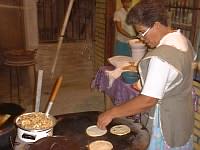 Just a block away from my hotel a friendly old woman was cooking carne
asada and tortillas. It was there that I met José, a Nicaraguan whom,
like me, was en route to Panamá. We chatted, he bought me dinner, and he
invited me to visit his farm in Nicaragua. It was too good an offer to
turn down. We made plans to meet in Chinandega two days hence. Even with
the bus trip to a nearby town, I didn't have quite enough time to make it
to Chinandega in two days. So I decided to take the bus another 20k
further. The first bus left at 6am, so I arrived at the station at 5:45,
in plenty of time to load my bike. Or so I thought. As I was busily
disassembling my bike, the man loading bags into the bus decided that he
didn't want to deal with my bike, so he told me to wait for the next bus,
which he assured me was leaving in 10 minutes. I was pretty sure there
wasn't another bus for over an hour, so I ran over to the ticket booth to
confirm. As I suspected, the next bus was scheduled to leave at 7:30. I
ran back to the bus, but they pulled away to keep me from boarding. I took
the 7:30 bus.
Just a block away from my hotel a friendly old woman was cooking carne
asada and tortillas. It was there that I met José, a Nicaraguan whom,
like me, was en route to Panamá. We chatted, he bought me dinner, and he
invited me to visit his farm in Nicaragua. It was too good an offer to
turn down. We made plans to meet in Chinandega two days hence. Even with
the bus trip to a nearby town, I didn't have quite enough time to make it
to Chinandega in two days. So I decided to take the bus another 20k
further. The first bus left at 6am, so I arrived at the station at 5:45,
in plenty of time to load my bike. Or so I thought. As I was busily
disassembling my bike, the man loading bags into the bus decided that he
didn't want to deal with my bike, so he told me to wait for the next bus,
which he assured me was leaving in 10 minutes. I was pretty sure there
wasn't another bus for over an hour, so I ran over to the ticket booth to
confirm. As I suspected, the next bus was scheduled to leave at 7:30. I
ran back to the bus, but they pulled away to keep me from boarding. I took
the 7:30 bus.
The bus was standing room only, but unlike every other time I'd been in
a packed bus, the money collector seemed very concerned about the
overcrowding. Every few minutes, he would make everyone standing crouch
down, apparently afraid that some official along the route would take
notice. I watched in horror as the bus crawled down some of the most
tantilizing downhills I had seen in ages. If I would have been biking, I
would have been screaming down the hill. My bus shortcut was turning out
to not be a time saver at all.
The terrain was slightly downhill most of the day, but the scorching
heat robbed me of the oppportunity of enjoying it. Since I was on a tight
schedule to get to Chinandega by the next day, I didn't get to sit out the
hottest hours of the day. I couldn't drink water fast enough; it seemed
to go straight from my mouth to my pores. I eventally bypassed the
intermediate step and just started pouring water all over myself. My
purple bking shirt was almost entirely white from the salt of my sweat. My
goal was the border town of El Triunfo, but as it was getting dark, I
decided to camp at the side of the road a few kilometers short. There were
slim pickings for campsites, and I had to hunt for somewhere even slightly
level. One spot was promising. I heard what I thought was running water
nearby, but it turned out to be the sound of thousands of long-legged
spiders rustling through the leaves. The insect situation wasn't much
better elsewhere, so as soon as my bivy touched ground, I frantically
zipped myself inside. Even with my rapid entrance, I found myself sharing
quarters with five grasshopers, three spiders, three large
beetle/cockroach looking things, and various flying critters. Those who
did not promptly accept my offer of exit through an open zipper were dealt
with by other means. It was a hot evening, and my "breathable" bivy sack
couldn't breathe enough to vent away my copious sweat. Seeing as it was
only 7pm, I tried to keep myself busy by eating and writing, but I barely
had enough room to hold my pen upright. I resigned myself to quietly
sweating and watching the bugs run back and forth across the mosquito
netting. I eventually fell asleep, awash in a pool of my own sweat and
squashed bugs.
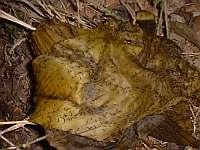 At 4am I was abruptly awoken by a sharp, jabbing pain all over my body.
Somehow, a swarm of biting ants had found a secret passage into my bivy,
and were making quick work of my skin. I immediately evacuated the
premises and cleared everyone out. I didn't get any more sleep.
At 4am I was abruptly awoken by a sharp, jabbing pain all over my body.
Somehow, a swarm of biting ants had found a secret passage into my bivy,
and were making quick work of my skin. I immediately evacuated the
premises and cleared everyone out. I didn't get any more sleep.
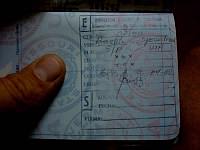 At daybreak, I packed up and continued my push for the border, arriving
before the gates were open. It costs US$7 to enter Nicaragua, and you have
to pay in dollars. It doesn't say a lot about the stability of a currency
when the government won't even use it. After an hour of formalities, I was
at the border of Nicaragua, stamped passport in hand. But I was stopped as
I tried to cross - I hadn't registered my vehicle. That's right, I had to
go through another hour of bureacracy to get my bike's papers in order.
Seeing as my bike is a dependent, it was allowed to share my passport,
although it required an entry visa and I did not. Back to the border
crossing I went, and this time I sailed right through.
At daybreak, I packed up and continued my push for the border, arriving
before the gates were open. It costs US$7 to enter Nicaragua, and you have
to pay in dollars. It doesn't say a lot about the stability of a currency
when the government won't even use it. After an hour of formalities, I was
at the border of Nicaragua, stamped passport in hand. But I was stopped as
I tried to cross - I hadn't registered my vehicle. That's right, I had to
go through another hour of bureacracy to get my bike's papers in order.
Seeing as my bike is a dependent, it was allowed to share my passport,
although it required an entry visa and I did not. Back to the border
crossing I went, and this time I sailed right through.
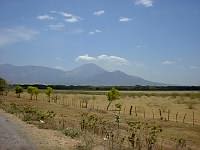 The Pacific coast of Nicaragua is flat, hot, and desolate. As far as the
eye could see were low shrubs and dirt. The heat problem was quickly
solved by the 30kt headwinds that ripped through the place. I alternated
my time between battling winds and taking cover in the bunker-like
buildings that sold water. The general rule for third world travel is to
avoid drirnking unfiltered water or drinking anything with ice. You need
to make sure that bottles of water are factory sealed. All of that went
out the window. The only water available was sold in little baggies, with
a knot in top to seal it. I gladly gulped them down, preferably served
over ice. It was just too dry and hot to consider anything else.
The Pacific coast of Nicaragua is flat, hot, and desolate. As far as the
eye could see were low shrubs and dirt. The heat problem was quickly
solved by the 30kt headwinds that ripped through the place. I alternated
my time between battling winds and taking cover in the bunker-like
buildings that sold water. The general rule for third world travel is to
avoid drirnking unfiltered water or drinking anything with ice. You need
to make sure that bottles of water are factory sealed. All of that went
out the window. The only water available was sold in little baggies, with
a knot in top to seal it. I gladly gulped them down, preferably served
over ice. It was just too dry and hot to consider anything else.
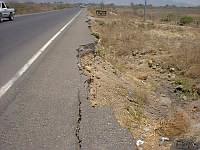 The roads were bad - large potholes connected together with patches of
pavement. The abuse proved to be too much for my camera, as my most
expensive lens literally shook apart. An internal lens element unscrewewd
itself from all the vibrations, and the metal casing rattled around between
the adjacent glass elements. My camera was demanding as much repair time
as my bike.
The roads were bad - large potholes connected together with patches of
pavement. The abuse proved to be too much for my camera, as my most
expensive lens literally shook apart. An internal lens element unscrewewd
itself from all the vibrations, and the metal casing rattled around between
the adjacent glass elements. My camera was demanding as much repair time
as my bike.
Smooth roads and a favorable shift in wind direction in the afternoon
made up for time lost at the border, and I found myself in Chinandega in
plenty of time to meet José. Unfortunately, it was a moot point, as he
never showed. I waited at the designated meeting spot, eating eskimo pies,
until I could stomach no more. I headed on to León.
León was a vast improvement on the hot, dry, and charm-free Chinandega,
but it suffered from the same food quality problems as Honduras: not much
good local food, a few places selling spagetti for US$5/plate, and lots of
hot dogs.
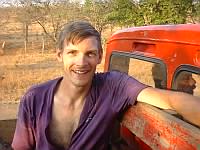 I managed to keep myself busy in the morning, by which time it was too hot
to travel, so I didn't get biking to Managua until 2pm. Even without
headwinds, 90k is a lot to do in 4 hours, and with winds I didn't have even
the slightest chance of arriving in Managua that day. As I struggled
against the wind, bouncing from one pothole to the next, a flatbed truck
pulled up and offered me a ride. It was exactly what I needed. I hopped
on board and sat watching the sunset from the bed of the truck. I was
dropped off about 30k short, but after only a few minutes of riding, a man
at the side of the road flagged me down and offered me a ride the rest of
the way to Managua in his truck. It was my lucky day. The man was an
ex-pat from Alabama, who had decided to leave his practice as a lawyer in
the states and start a new life in Nicaragua. He thoughtfully pointed out
every speedtrap on the way, as we barreled past them. We arrived about
6:30, and he dropped me off near some hostels. I rode in the direction of
the hostels, but only managed to find a bunch of optomistrists.
Conveniently, the city of Managua had thoughtfully placed prostitutes at
every streetcorner to provide directions. Unfortunately, none of them knew
of the place where I wanted to go.
I managed to keep myself busy in the morning, by which time it was too hot
to travel, so I didn't get biking to Managua until 2pm. Even without
headwinds, 90k is a lot to do in 4 hours, and with winds I didn't have even
the slightest chance of arriving in Managua that day. As I struggled
against the wind, bouncing from one pothole to the next, a flatbed truck
pulled up and offered me a ride. It was exactly what I needed. I hopped
on board and sat watching the sunset from the bed of the truck. I was
dropped off about 30k short, but after only a few minutes of riding, a man
at the side of the road flagged me down and offered me a ride the rest of
the way to Managua in his truck. It was my lucky day. The man was an
ex-pat from Alabama, who had decided to leave his practice as a lawyer in
the states and start a new life in Nicaragua. He thoughtfully pointed out
every speedtrap on the way, as we barreled past them. We arrived about
6:30, and he dropped me off near some hostels. I rode in the direction of
the hostels, but only managed to find a bunch of optomistrists.
Conveniently, the city of Managua had thoughtfully placed prostitutes at
every streetcorner to provide directions. Unfortunately, none of them knew
of the place where I wanted to go.
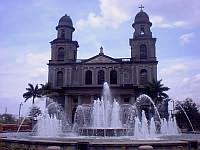 Managua was a strange place. Once a beautiful colonial town, it was
destroyed in an earthquake in '72. Having discoved the hard way that the
town center was build on a faultline, new development moved to the outskirts
of the city. The end result was a series of districts spread out over a
large area, with no center. The districts were connected with wide,
unmarked and featureless roadways. The lack of signs, directions or a
decent map left me wandering aimlessly. I eventually found the old
cathedral, which was in the old city center, and used it to orient myself.
By that point it was 7pm and dark, but I stuck to major streets that were
well lit.
Managua was a strange place. Once a beautiful colonial town, it was
destroyed in an earthquake in '72. Having discoved the hard way that the
town center was build on a faultline, new development moved to the outskirts
of the city. The end result was a series of districts spread out over a
large area, with no center. The districts were connected with wide,
unmarked and featureless roadways. The lack of signs, directions or a
decent map left me wandering aimlessly. I eventually found the old
cathedral, which was in the old city center, and used it to orient myself.
By that point it was 7pm and dark, but I stuck to major streets that were
well lit.
As I was riding on one such road, I noticed out of the corner of
my eye two men running at me. I immediately could tell they were up to no
good, and I started pedalling faster. Realizing that I wasn't going to
escape, and not wanting to be attacked from behind, I ditched the bike at
full speed, slamming into the pavement in the process. I jumped up to face
my attackers. Both men in their early 20's, one had a wood pole, four feet
long and 2 1/2" in diameter, the other a knife.
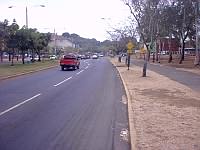 The one with the pole started beating me repeatedly on the head, but seeing
as I was wearing a bike helmet, I could barely feel the blows. Apparently
upset that his beating was not having the desired effect, he increased the
intensity, each blow more forceful than the last. My trusty helmet stayed
intact. The man with the pole rendered impotent, I focused my attention on
the one with the knife, who was starting to cart my entire bike, laden with
panniers full of all of my money, my clothes, my passport, my camera gear
and all of my worldly possessions, into the darkness. Somehow, I don't
think he knew what he was in for. My bike, when fully loaded, weighs in at
about 100 lbs, and is not exactly a snatch and run item. Like an overly
ambitions ant trying to carry away too much, he struggled and strained to
carry away his prize, but I kept the bike on the ground, knowing that the
only was it was going to move was if it was delicately rolled away. He
slashed at me with his blade several times as I held down the frame,
hitting me several times. With my holding down the bike, and with his
partner still whacking away in vain, they made little progress. As a wave
of vehicles approached, they cut their losses and ran back into the wooded
darkness. Seeing as the bike was still in the middle of the road, the
traffic stopped, and I got my bike upright and rolled it down the center
of the road, the cars escorting me from behind. Once at the traffic light,
I flagged down the first taxi I could find, threw the bike part way into
the trunk, and we drove off to the hostel. I was only a kilometer away,
but the driver had the nerve to charge me 50 Cordobas (about US$3.50) for
the priviledge, and I was in no position to negotiate.
The one with the pole started beating me repeatedly on the head, but seeing
as I was wearing a bike helmet, I could barely feel the blows. Apparently
upset that his beating was not having the desired effect, he increased the
intensity, each blow more forceful than the last. My trusty helmet stayed
intact. The man with the pole rendered impotent, I focused my attention on
the one with the knife, who was starting to cart my entire bike, laden with
panniers full of all of my money, my clothes, my passport, my camera gear
and all of my worldly possessions, into the darkness. Somehow, I don't
think he knew what he was in for. My bike, when fully loaded, weighs in at
about 100 lbs, and is not exactly a snatch and run item. Like an overly
ambitions ant trying to carry away too much, he struggled and strained to
carry away his prize, but I kept the bike on the ground, knowing that the
only was it was going to move was if it was delicately rolled away. He
slashed at me with his blade several times as I held down the frame,
hitting me several times. With my holding down the bike, and with his
partner still whacking away in vain, they made little progress. As a wave
of vehicles approached, they cut their losses and ran back into the wooded
darkness. Seeing as the bike was still in the middle of the road, the
traffic stopped, and I got my bike upright and rolled it down the center
of the road, the cars escorting me from behind. Once at the traffic light,
I flagged down the first taxi I could find, threw the bike part way into
the trunk, and we drove off to the hostel. I was only a kilometer away,
but the driver had the nerve to charge me 50 Cordobas (about US$3.50) for
the priviledge, and I was in no position to negotiate.
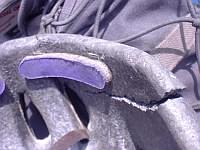 The final damage report: bad road rash on one hip, a skinned knee, a
badly bruised shoulder, all from laying down the bike. On my left arm
there was the slightest knife cut, barely worth mentioning. I don't know
what kind of knife he was using, but it certainly needed sharpening. My
helmet was the only victim, having cracked all the way through in several
places from the punishment. I always knew that a bike helmet would save my
life someday, I just never expected it would be like this.
The final damage report: bad road rash on one hip, a skinned knee, a
badly bruised shoulder, all from laying down the bike. On my left arm
there was the slightest knife cut, barely worth mentioning. I don't know
what kind of knife he was using, but it certainly needed sharpening. My
helmet was the only victim, having cracked all the way through in several
places from the punishment. I always knew that a bike helmet would save my
life someday, I just never expected it would be like this.
Safely holed up in my hostel, I started the first aid: I put neosporin
on my various wounds, then headed across the street to the bar where they
sold rum by the bottle. Nicaragua was not winning many points with me.
As Matt Groening might say, "Nicaragua - where the elite meet to be beat
and to suffer from the heat."
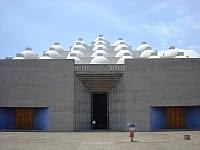 The next morning I was ready to leave Managua far behind, so after spending
some time chatting with a great group of new Peace Corp recruits (Hi Kimberly,
Katherine, and Shane - good luck!), I headed out on a whirlwidn tour of the
city. Featured stops included the new, gaudy cathedral (which had a
Christe encased in a glass dome) and the scene of the crime from the
previous night. After confirming that Managua didn't have amuch more going
for it in the daylight, I high-tailed it to Granada. I was told it was
only 30k away, bu tit truned out to be 60km, once again into headwinds.
The next morning I was ready to leave Managua far behind, so after spending
some time chatting with a great group of new Peace Corp recruits (Hi Kimberly,
Katherine, and Shane - good luck!), I headed out on a whirlwidn tour of the
city. Featured stops included the new, gaudy cathedral (which had a
Christe encased in a glass dome) and the scene of the crime from the
previous night. After confirming that Managua didn't have amuch more going
for it in the daylight, I high-tailed it to Granada. I was told it was
only 30k away, bu tit truned out to be 60km, once again into headwinds.
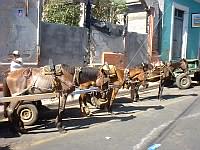 As I rode into Granada, it was as if I were waking up from a bad dream,
finding myself safe in my cozy bed. Granada was warm and inviting, and the
people charming and helpful. The late afternoon sun set the place aglow.
Every few blocks sat a beautiful colonial-era cathedral, and a few blocks
from the main street, a beach on Lake Nicaragua, with palm trees and gently
rolling waves. This was not the Nicaragua I knew and hated - this was a
different country.
As I rode into Granada, it was as if I were waking up from a bad dream,
finding myself safe in my cozy bed. Granada was warm and inviting, and the
people charming and helpful. The late afternoon sun set the place aglow.
Every few blocks sat a beautiful colonial-era cathedral, and a few blocks
from the main street, a beach on Lake Nicaragua, with palm trees and gently
rolling waves. This was not the Nicaragua I knew and hated - this was a
different country.
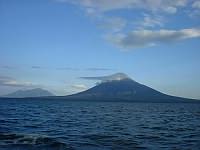 I spent two more days there, eating great food, photographing the
market, even going out to the movies. I could have spent a week there but
I had some serious relaxing to do - on the island of Ometepe.
I spent two more days there, eating great food, photographing the
market, even going out to the movies. I could have spent a week there but
I had some serious relaxing to do - on the island of Ometepe.
Ometepe is the largest fresh water island in the world. It is volcanic,
with two large volcanos dominating the landscape. One of them,
Concepción, is a perfect cone, and is still active. Ometepe is also home
to the nicest people in Nicaragua, thanks to a combination of tropical
mellowness and the fact that the war passed Ometepe by.
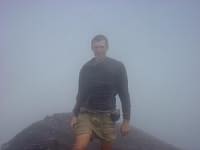 My first morning, I headed out with a guide to climb Concepción, Whoever
blazed the trail to the top obviously didn't like switchbacks, since the
trail went straight up, through thick jungle. The howler monkeys laughed
as I struggled up the muddy, slick train, my biking shoes completely
inadequate for the task. Luckily I carried all 15 lbs. of my camera gear,
so I could get a fine shot of the pea soup thick fog and 50kt winds at the
top. The round trip took 7 hours, with nearly 5000ft of rise, which pretty
much finished me off for the day.
My first morning, I headed out with a guide to climb Concepción, Whoever
blazed the trail to the top obviously didn't like switchbacks, since the
trail went straight up, through thick jungle. The howler monkeys laughed
as I struggled up the muddy, slick train, my biking shoes completely
inadequate for the task. Luckily I carried all 15 lbs. of my camera gear,
so I could get a fine shot of the pea soup thick fog and 50kt winds at the
top. The round trip took 7 hours, with nearly 5000ft of rise, which pretty
much finished me off for the day.
The next day, my legs trashed from the previous day's climb, I went for a
"short" bike ride to the next village, which turned out to be a 55km
journey over soft, volcanic sand. I didn't bother to bring my tools and
spare parts, so consequently I broke both a derallier cable and my
chain.
The age old question asks, "Why did the chicken cross the road?" A
better question would be why didn't anyone teach it to look both ways before
crossing. One ran right in front of my wheel on the way back. I ran right
over it, but when the feathers cleared, it had somehow survived, and it
made it to the other side.
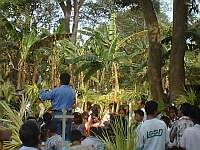 I was in Ometepe for the beginning of Semana Santa, the holy week between
Palm Sunday and Easter. On Palm Sunday, pretty much the entire island
carried palm fronds, neatly tied in the shape of crosses, out to the palm
fields. There, everyone sang, danced, prayed, and waved their palm fronds
in unison. It was an amazing show of faith.
I was in Ometepe for the beginning of Semana Santa, the holy week between
Palm Sunday and Easter. On Palm Sunday, pretty much the entire island
carried palm fronds, neatly tied in the shape of crosses, out to the palm
fields. There, everyone sang, danced, prayed, and waved their palm fronds
in unison. It was an amazing show of faith.
By the last night, I had settled into a routine: the same house for
dinner, the same soda stand for orange soda and "Cremino" chocolates, and a
chat with the wonderful old couple that tended it. Ometepe had restored my
faith in Nicaragua. It was a place where pigs walked the streets, where
young couples would ride two to a bike, where it was safe to stroll through
the park by moonlight. I was sorry to leave, but the time came to catch
the boat to San Carlos, the beginning of my long journey to Panamá.



